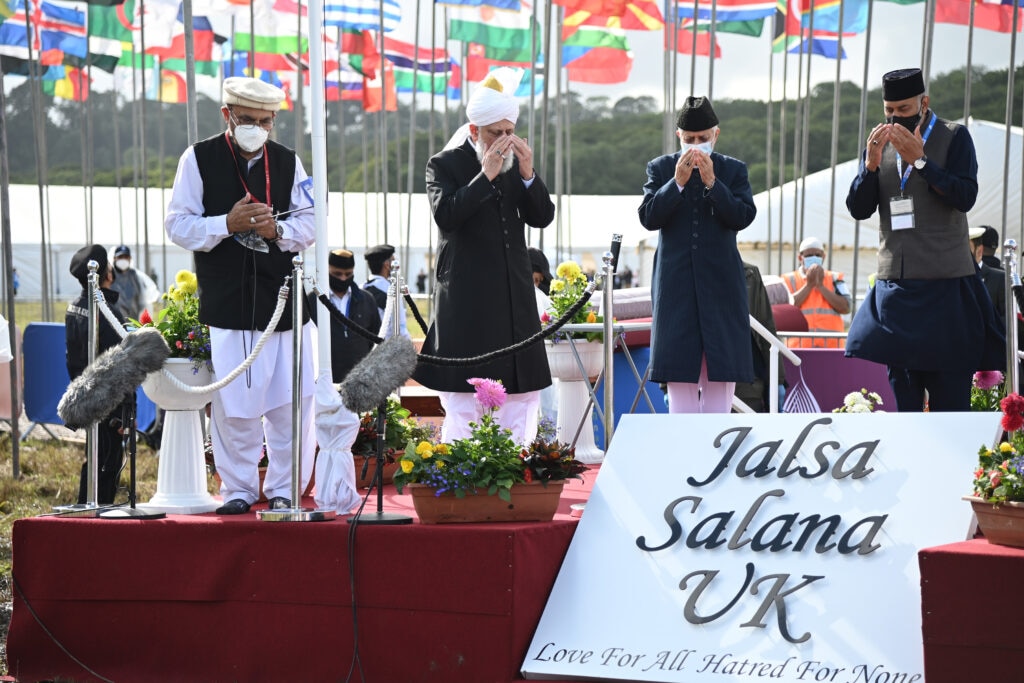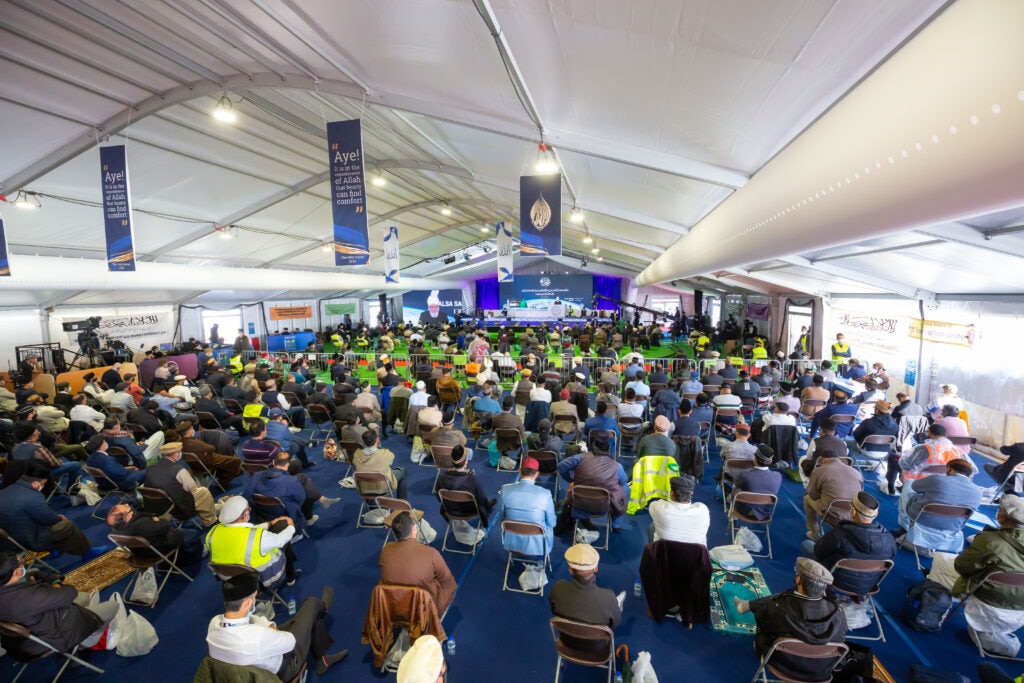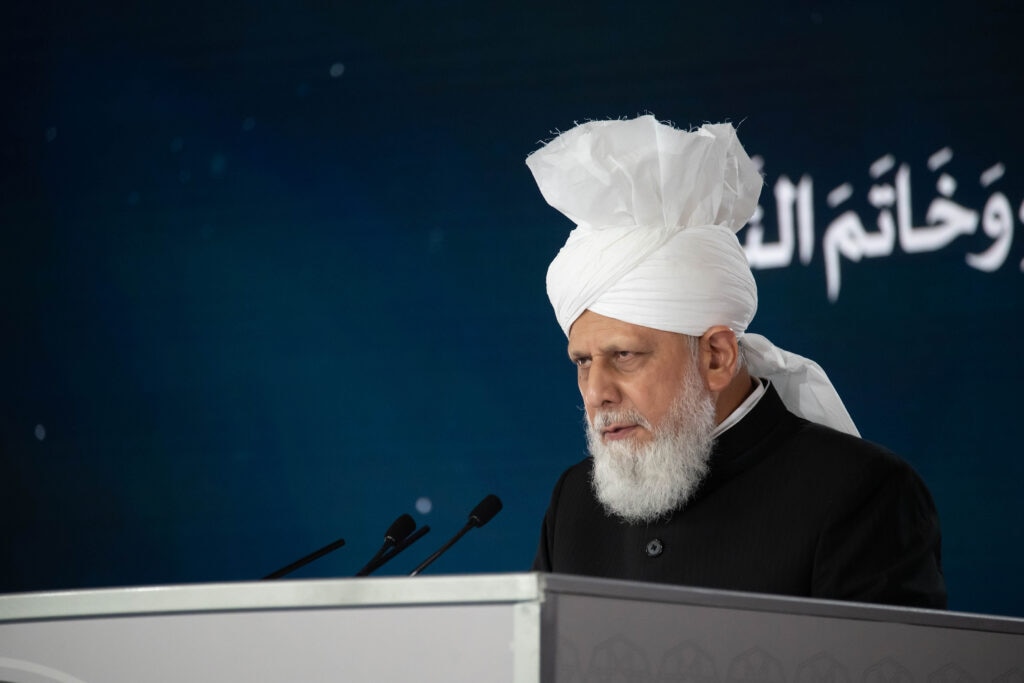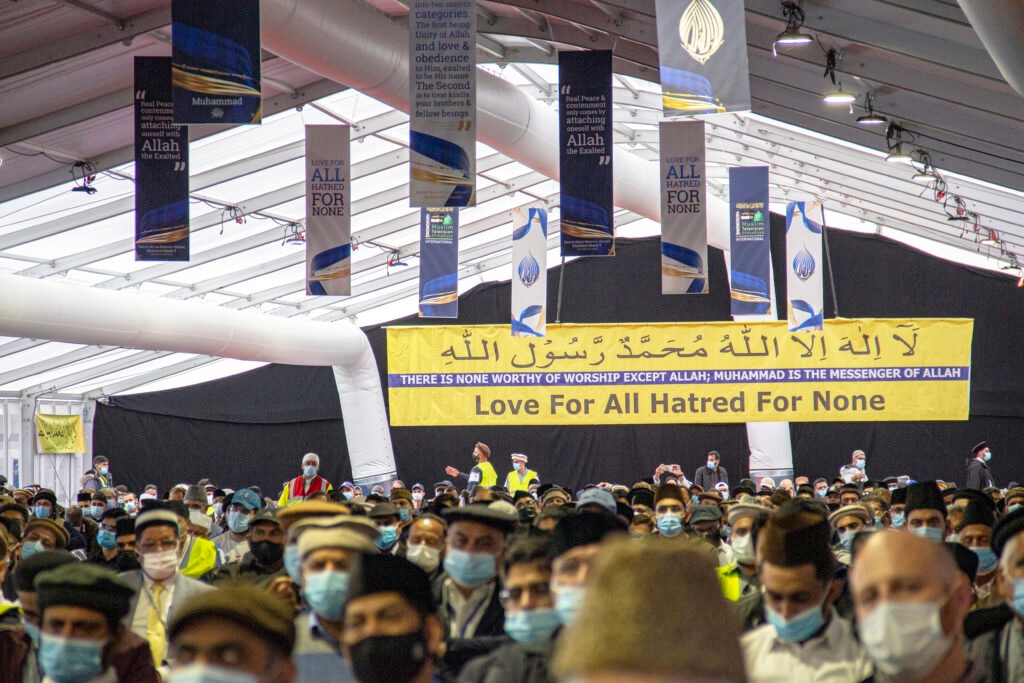Hazrat Amirul Momineen, Khalifatul Masih Vaa inaugurates the 55th Jalsa Salana UK, the Annual Convention of the Ahmadiyya Muslim Community United Kingdom
Hadeeqatul Mahdi, 6 August 2021:
At around 4:30 pm, Hazrat Mirza Masroor Ahmad, Khalifatul Masih Vaa arrived at the site where flags of various nations are being hoisted, symbolising those nations’ virtual participation in this central Jalsa through MTA International. There, Huzooraa hoisted the Liwa-e-Ahmadiyyat, the flag of Ahmadiyyat, accompanied by loud slogans of the unity of Allah (na‘ra-hae-takbir). He then led everyone in dua (silent prayer). After the flag hoisting ceremony, Huzooraa proceeded to the main Jalsa Gah for the inaugural session.

Huzooraa came to the stage and greeted everyone with the greeting of assalamo alaikum wa rahmatullah. The inaugural session then started with the recitation of the Holy Quran, followed by its Urdu translation from Tafsir-e-Saghir, both presented by Feroz Alam Sahib:
يٰۤاَيُّهَا الَّذِيۡنَ اٰمَنُوا اتَّقُوا اللّٰهَ وَ لۡتَنۡظُرۡ نَفۡسٌ مَّا قَدَّمَتۡ لِغَدٍ ۚ وَ اتَّقُوا اللّٰهَ ؕ اِنَّ اللّٰهَ خَبِيۡرٌۢ بِمَا تَعۡمَلُوۡنَ ۔ وَ لَا تَكُوۡنُوۡا كَالَّذِيۡنَ نَسُوا اللّٰهَ فَاَنۡسٰهُمۡ اَنۡفُسَهُمۡ ؕ اُولٰٓئِكَ هُمُ الۡفٰسِقُوۡنَ ۔ لَا يَسۡتَوِيۡۤ اَصۡحٰبُ النَّارِ وَ اَصۡحٰبُ الۡجَنَّةِ ؕ اَصۡحٰبُ الۡجَنَّةِ هُمُ الۡفَآئِزُوۡنَ ۔ لَوۡ اَنۡزَلۡنَا هٰذَا الۡقُرۡاٰنَ عَلٰي جَبَلٍ لَّرَاَيۡتَهٗ خَاشِعًا مُّتَصَدِّعًا مِّنۡ خَشۡيَةِ اللّٰهِ ؕ وَ تِلۡكَ الۡاَمۡثَالُ نَضۡرِبُهَا لِلنَّاسِ لَعَلَّهُمۡ يَتَفَكَّرُوۡنَ ۔ هُوَ اللّٰهُ الَّذِيۡ لَاۤ اِلٰهَ اِلَّا هُوَ ۚ عٰلِمُ الۡغَيۡبِ وَ الشَّهَادَةِ ۚ هُوَ الرَّحۡمٰنُ الرَّحِيۡمُ ۔ هُوَ اللّٰهُ الَّذِيۡ لَاۤ اِلٰهَ اِلَّا هُوَ ۚ اَلۡمَلِكُ الۡقُدُّوۡسُ السَّلٰمُ الۡمُؤۡمِنُ الۡمُهَيۡمِنُ الۡعَزِيۡزُ الۡجَبَّارُ الۡمُتَكَبِّرُ ؕ سُبۡحٰنَ اللّٰهِ عَمَّا يُشۡرِكُوۡنَ ۔ هُوَ اللّٰهُ الۡخَالِقُ الۡبَارِئُ الۡمُصَوِّرُ لَهُ الۡاَسۡمَآءُ الۡحُسۡنٰي ؕ يُسَبِّحُ لَهٗ مَا فِي السَّمٰوٰتِ وَ الۡاَرۡضِ ۚ وَ هُوَ الۡعَزِيۡزُ الۡحَكِيۡمُ
“O ye who believe! fear Allah; and let every soul look to what it sends forth for the morrow. And fear Allah; verily Allah is Well-Aware of what you do. And be not like those who forgot Allah, and whom He has [consequently] caused to forget their own souls. It is they that are the rebellious. The inmates of the Fire and the inmates of the Garden are not equal. It is the inmates of the Garden that will triumph. If We had sent down this Quran on a mountain, thou wouldst certainly have seen it humbled and rent asunder for fear of Allah. And these are similitudes that We set forth for mankind that they may reflect. He is Allah, and there is no God beside Him, the Knower of the unseen and the seen. He is the Gracious, the Merciful. He is Allah, and there is no God beside Him, the Sovereign, the Holy One, the Source of Peace, the Bestower of Security, the Protector, the Mighty, the Subduer, the Exalted. Holy is Allah far above that which they associate with Him. He is Allah, the Creator, the Maker, the Fashioner. His are the most beautiful names. All that is in the heavens and the earth glorifies Him, and He is the Mighty, the Wise.” (Surah al-Hashr, Ch.59: V. 19-25)
Next, a Persian poem of the Hazrat Mirza Ghulam Ahmadas of Qadian, written in praise of His Master, the Holy Prophet Muhammadsa, and its Urdu translation was presented by Syed Ashiq Hussain Sahib. This was followed by an Urdu poem on the theme of taqwa i.e. righteousness, written by the Promised Messiahas, presented by Ahmad Saboor Bhatti Sahib. The poem goes by the refrain “Fa subhanalladhi akhzal a‘aadi” (Holy is He Who has confounded my foes).
Then, Hazrat Amirul Momineenaa came to the podium and once again conveyed his salaam to everyone. He then recited tashahud, ta‘awuz and Surah al-Fatihah and delivered his inaugural address, a brief summary of which is as follows:
The Promised Messiahas has mentioned the forging of a special relationship with Allah the Exalted and listening to and acting upon the sayings of the Holy Prophetsa and reforming ourselves, among the special objectives of Jalsa Salana. In other words, it is in order to quench our spiritual thirst that we congregate during these three days. Therefore, we must always keep this objective before us at all times.
As I also stated during the Friday Sermon, this year’s Jalsa Salana is scaled back due to special circumstances. Moreover, we are holding the Jalsa Salana after a gap of one year. May Allah the Exalted soon eradicate this virus and the pandemic. May He have mercy upon all of us. May the circumstances normalise again and may we be able to hold the Jalsa with all its glory.
However, real glory and splendour are achieved when the attendees pay attention to bringing about a pious change in themselves and when they follow a permanent path of taqwa. As has been mentioned, it is in order to quench our spiritual thirst that we have congregated here. This does not at all mean that we should consider it sufficient to drink spiritual water just once. The true and lasting benefit lies in listening to the commandments of Allah and His Messengersa and thereby quenching our spiritual thirst and then carrying that water further in order to quench our spiritual thirst throughout the year and to continuously procure the means of spiritual life for us. We should not revert back to the old ways after the pious experience of these three days and after having brought about a pious change in ourselves.
On this occasion, certain jamaats have made collective arrangements for this Jalsa Salana to be listened to or watched according to their circumstances. We can see it on our screens. This is also a new experience and a new tradition that has been introduced into the Jamaat which is a righteous tradition. Ahmadis are sitting in various countries, and different jamaats, in their mosques and halls, and they are participating in this Jalsa in that way. While they are sat in their jamaats, they are directly looking at the Jalsa Salana and we can see them too. This is also one of the special blessings of Allah the Exalted. Despite the difficult circumstances, Allah the Exalted has opened up such new avenues that are greatly benefitting the global Jamaat as a whole. Anyhow, various jamaats are sitting in their respective areas in some of the countries and watching the proceedings of this Jalsa. Some people will be watching the proceedings of the Jalsa individually in their homes.
The impact of this Jalsa should permeate every individual in such a way that it becomes part and parcel of their lives on a permanent basis. It is only then that we can say that we have truly fulfilled the objectives of Jalsa Salana and have fulfilled the pledge of allegiance that we made to Allah the Exalted at the hands of the Promised Messiahas. As a result of this, we will benefit from the prayers of the Promised Messiahas. However, if we fail to achieve the aforementioned aims, then we will remain deprived of the blessings of the Jalsa Salana.
In this modern age, it is Allah the Almighty’s great blessing and favour that He has enabled us to believe in the Promised Messiahas, who showed us the paths of following the commandments of Allah and His Messengersa, the paths, when followed, bring one closer to Allah the Exalted and help us benefit from the prayers of the Holy Prophetsa. Thus, every single one of us should try our level best to pay special attention to these matters during these three days. Whether one is physically present at the Jalsa Salana or listening to the Jalsa Salana through the various arrangements of the Jamaats, or listening at home, one should always keep the objectives of the Jalsa Salana in mind. On different occasions, the Promised Messiahas has explained and expounded upon these objectives. The summary of these objectives, in a sentence, would be to tread upon the path of taqwa, righteousness and piety.

The Promised Messiahas said, “Inculcate zuhd!” How will zuhd be achieved? Certainly, not without taqwa. Zuhd means sacrificing one’s desires and staying away from every evil. However, zuhd and taqwa do not entail that one should merely steer clear of every evil deed; rather, it also means to vehemently reject evil deeds by presenting a strong front against them. It means to stay away from evil desires for the sake of God Almighty and to entrust all of one’s affairs to God Almighty and to only bow down before Him. With this one word, the Promised Messiahas has given us that advice, which, if acted upon, could bring about a revolution in our lives.
However, this does not mean that one should completely cut oneself off from all worldly affairs. The Holy Prophetsa has also explained that it is wrong to give up all worldly affairs and move to the wilderness. It is forbidden in Islam to neglect one’s property and to waste it. It is also forbidden in Islam not to fulfil the rights of one’s relations. Zuhd means to sacrifice one’s desires while staying in this very world and fulfilling all of its related duties. However, no worldly desire should become an obstacle in our way to finding Allah. If Allah has blessed one with honour and wealth, they should be spent on fulfilling the rights of Allah and His creation. The Promised Messiahas has explained that “Even when you are carrying out your worldly works, always give precedence to your faith.” This is the distinctive quality of a true believer; they look after their worldly affairs, but that never becomes their ultimate goal. The Promised Messiahas further stated, “The Companions also used to operate businesses worth hundreds of thousands but they would not forget the rights owed to Allah the Exalted and His creation even for a moment.”
With reference to Tazkiratul Auliya, the Promised Messiahas has said:
“There used to be a man, who was engaged in a business worth thousands. A waliullah [friend of Allah] saw him and glanced at him with his spiritual sight. Then he realised that his heart was not unmindful of the Almighty God in spite of being engaged in such an extensive business. About such people, God Almighty states:
لَا تُلۡهِيۡهِمۡ تِجَارَةٌ وَلاَ بَيۡعٌ عَنۡ ذِكۡرِ اللّٰه
“i.e. ‘Neither any trade nor buying or selling makes them neglectful.’ (Surah al-Nur, Ch.24: V.38) And the perfection of man is that he should be engaged in worldly business but should not forget God […] The poor man who becomes a recluse in fear of worldly affairs shows weakness. There is no monasticism in Islam. We never say give up women and children and give up worldly business. No, the employee should perform the duties of his job and the trader should look after his business but they should always give precedence to faith.”
This is the true essence of zuhd. Hence, we need to assess whether we are trying to attain this level of zuhd. These things will be achieved when there is taqwa, when we will keep away from vain things for the sake of Allah and when we will try to avoid immoral behaviour. Moreover, taqwa does not only mean to struggle and abstain from immoral ways; but rather, it also requires from us that we demonstrate the highest moral standards, that we keep clear of vain things, that we spread goodness and that our wealth does not cause distances between us and our brothers, but rather promotes love and brotherhood.
Thus, we all need to assess our states in this regard so that we may inculcate such zuhd that our worldly affairs become a subservient part of our faith and a means to achieve the pleasure of God Almighty. This cannot come about without the fear and love of Allah the Exalted. That is called taqwa.
The Promised Messiahas is not talking about a general kind of piety and fear of Allah; rather, he has stated that its standard should be such that you become the example for it. People should say that if anyone wishes to see a truly pious person who fears God and does truly righteous deeds and keeps the fear of God before him in every action, then one should see this Ahmadi. Thus, we need to assess ourselves in view of this advice.

Another excellent moral quality towards which the Promised Messiahas has drawn our attention, is softness, kind-heartedness and suppressing anger. This is one of the ways to attain the love of Allah. Forgiving and having a soft heart for people, despite their ill-treatment is a great moral quality, which is mentioned in the Holy Quran as follows,
وَ الۡكٰظِمِيۡنَ الۡغَيۡظَ وَ الۡعَافِيۡنَ عَنِ النَّاسِ ؕ وَ اللّٰهُ يُحِبُّ الۡمُحۡسِنِيۡنَ
Meaning, “Those who suppress anger and pardon men; and Allah loves those who do good.” (Surah Al-e-Imran, Ch.3: V.135)
Enumerating the rewards of forgiving, the Promised Messiah, peace be on him, explains that we should remember that there is a dangerous enmity between intellect and anger. When passion and anger overwhelm, the intellect can’t prevail. But one who is patient and shows forbearance is given a light that freshly illuminates the power of his intellect and thinking. Then a brightness is created over the light. As the heart and brain are dark under anger and passion, a night falls over darkness.
Another moral quality towards which the Promised Messiahas has drawn our attention is brotherhood and fraternity. He said that every Ahmadi ought to become an example of love and brotherhood. The promotion of this is also one of the objectives of Jalsa Salana. The most excellent example of this is that of Ansar and Muhajireen, which has been honoured by the Holy Quran in the following words:
وَ الَّذِيۡنَ تَبَوَّؤُ الدَّارَ وَ الۡاِيۡمَانَ مِنۡ قَبۡلِهِمۡ يُحِبُّوۡنَ مَنۡ هَاجَرَ اِلَيۡهِمۡ وَ لَا يَجِدُوۡنَ فِيۡ صُدُوۡرِهِمۡ حَاجَةً مِّمَّاۤ اُوۡتُوۡا وَ يُؤۡثِرُوۡنَ عَلٰۤي اَنۡفُسِهِمۡ وَ لَوۡ كَانَ بِهِمۡ خَصَاصَةٌ ؕ۟ وَ مَنۡ يُّوۡقَ شُحَّ نَفۡسِهٖ فَاُولٰٓئِكَ هُمُ الۡمُفۡلِحُوۡنَ
“And those who had established[their] home [in this city] before them and [had accepted] faith, love those who came to them for refuge, and find not in their breasts any desire for that which is given them [Refugees], but prefer [the Refugees] to themselves, even though poverty be their [own lot]. And whoso is rid of the covetousness of his own soul – it is these who will be successful. (Surah al-Hashr, Ch.59: V.10)
It is for the creation of such a beautiful society that the Promised Messiahas established the institution of Jalsa Salana. Thus, admonishing his Jamaat, he said, “Unite with one another as though you were brothers from the same womb.”
Another moral quality towards which the Promised Messiahas has drawn our attention is humility and meekness. The Holy Quran states in this regard:
وَ لَا تُصَعِّرۡ خَدَّكَ لِلنَّاسِ وَ لَا تَمۡشِ فِي الۡاَرۡضِ مَرَحًا ؕ اِنَّ اللّٰهَ لَا يُحِبُّ كُلَّ مُخۡتَالٍ فَخُوۡرٍ
“And turn not thy cheek away from men in pride nor walk in the earth haughtily; Surely, Allah loves not any arrogant boaster.” (Surah Luqman, Ch.31: V.19)
Thus, if we wish to develop a love for Allah, we must first adopt meekness and humbleness. The Promised Messiahas states:
“A lot of men consider themselves humble but even they have some sort of arrogance within them. For this reason, one should safeguard against the subtlest types of arrogance. Sometimes wealth develops arrogance. A wealthy person considers other people as impoverished. He thinks [to himself], ‘Who is this person trying to contend with me?’ At times, people get arrogant due to family lineage and caste. One considers their family lineage to be superior over another family’s that they consider as inferior in comparison […] Every so often knowledge becomes a source of arrogance. When someone makes a mistake, such a person immediately points out the error and cries aloud ‘This person does not know how to say this word correctly.’ In short, arrogance exists in many forms and they all deprive a person of attaining virtuous deeds and prevent people from benefiting others. One should protect themselves from all of these.”

Another moral quality towards which the Promised Messiahas has drawn our attention is truthfulness. The Holy Prophetsa said:
“Truth guides to virtue, and virtue guides to Paradise. A person keeps telling the truth till in the sight of Allah, he is named truthful. Lying leads to vice, and vice leads to the Fire, and a person keeps lying till in the sight of Allah, he is named a liar.”
There are countless social ills, that can be eradicated and solved through truthfulness.
May Allah the Exalted make it so that we adopt the path of taqwa and that we bring upon these pious transformations within us and that in accordance with the wishes of the Promised Messiahas, we develop such taqwa that can save ourselves from performing any forms of evil deeds and enables us to perform good deeds. May this spiritual atmosphere that we are experiencing, create zuhd, piety, kindness, mutual love and affection, humility and humbleness, truthfulness and honesty in us and may we achieve all of this to the highest level. May this atmosphere of Jalsa bring about a spiritual revolution in everyone who is listening here or at home. It is only then that we can spread the message of the Imam of this Age, which is a message of true Islam, to the entire world. Otherwise, our preaching would only amount to empty words. May Allah the Exalted enable us to understand the message of the Promised Messiahas and enable us to act upon it.
We will now offer dua. Pray that we may be saved from the currently prevailing circumstances. May Allah have mercy on humanity and if there are any threats of a war taking place, may Allah remove those possibilities. May Allah enable for improved circumstances to prevail. May the same glorious Jalsas, as in the previous years, take place once again. May this be so in every country. Pray especially for the Ahmadis of Pakistan. May Allah the Exalted remove their anxieties and worries. Pray for everyone who is suffering in the world. May God alleviate their suffering. Pray for the asiran-e-rah-e-Maula, the prisoners in the way of Allah. May Allah soon bring about the means of their release.
Although most people are staying at home, everyone should especially offer Tahajud, the pre-dawn prayers, and remain engaged in zikr-e-ilahi [the remembrance of Allah] for it is only through prayers that we can attract the blessings of Allah.
May Allah the Exalted enable us to achieve all of this. [Amin.]
(Report prepared by Al Hakam)

